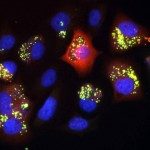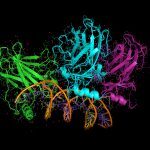Link to Pubmed [PMID] – 23792274
Link to DOI – 10.1016/j.freeradbiomed.2013.06.021S0891-5849(13)00302-X
Free Radic Biol Med 2013 Dec; 65(): 150-161
PknG from Mycobacterium tuberculosis is a Ser/Thr protein kinase that regulates key metabolic processes within the bacterial cell as well as signaling pathways from the infected host cell. This multidomain protein has a conserved canonical kinase domain with N- and C-terminal flanking regions of unclear functional roles. The N-terminus harbors a rubredoxin-like domain (Rbx), a bacterial protein module characterized by an iron ion coordinated by four cysteine residues. Disruption of the Rbx-metal binding site by simultaneous mutations of all the key cysteine residues significantly impairs PknG activity. This encouraged us to evaluate the effect of a nitro-fatty acid (9- and 10-nitro-octadeca-9-cis-enoic acid; OA-NO2) on PknG activity. Fatty acid nitroalkenes are electrophilic species produced during inflammation and metabolism that react with nucleophilic residues of target proteins (i.e., Cys and His), modulating protein function and subcellular distribution in a reversible manner. Here, we show that OA-NO2 inhibits kinase activity by covalently adducting PknG remote from the catalytic domain. Mass spectrometry-based analysis established that cysteines located at Rbx are the specific targets of the nitroalkene. Cys-nitroalkylation is a Michael addition reaction typically reverted by thiols. However, the reversible OA-NO2-mediated nitroalkylation of the kinase results in an irreversible inhibition of PknG. Cys adduction by OA-NO2 induced iron release from the Rbx domain, revealing a new strategy for the specific inhibition of PknG. These results affirm the relevance of the Rbx domain as a target for PknG inhibition and support that electrophilic lipid reactions of Rbx-Cys may represent a new drug strategy for specific PknG inhibition.



